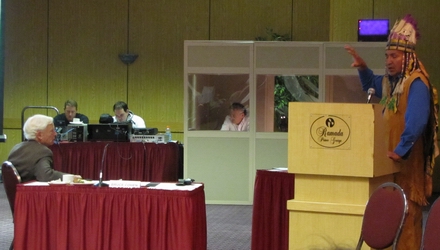Cohen Commission Hears Emotional Pleas
By 250 News
Thursday, September 23, 2010 07:32 PM

Justice Bruce Cohen listens as Peter Erickson describes his people's connection with the sockeye
Prince George, B.C. – The Cohen Commission on the decline of sockeye in the Fraser River heard emotional presentations, but little in the way of solutions to the problem.
About 30 people were on hand for the Commission's public forum in Prince George, the 8th of 10 planned forums. Most in attendance were First Nations. Evidentiary hearings which will involve receiving submissions from some 21 groups given official standing are set to start late next month in Vancouver. The Federal Government has provided $3.4 million dollars to those groups so they could participate in those hearings.
Sockeye salmon have been in decline for more than a decade and scientists are at a loss to explain why the return of 2009 was so low, and the return of 2010 was a record high.
Last year, it was expected there would be 10.5 million sockeye return to the Fraser River, the actual number was closer to 1.5 million.
David Loewen, originally from Haida Gwaii now a resident of Prince George, was the first to address the Commission. He presented a brief pictorial history of the reliance of mammals, including man, on salmon. Although noting there will be plenty of opportunity for finger pointing, he is of the mind logging has had an impact on the riparian habitat. “The odd thing about reclamation is that nobody really monitors it, and I’ll tell you what, preservation is a hell of a lot easier than reclamation.” Loewen also says there is conflicting information on how big the sockeye runs have been in the past. There are estimates of 30 million in the late 1800’s which Lorwen says could be actually a small fraction of the real numbers if historical knowledge of First Nations is taken into account.
He says most of the reports to date conclude in asking for more money to do more research, more research he says "will only produce more bumpf". He says the first thing that must be done is that each and every person must accept some of the blame for the current state of the salmon fishery, only then can people work towards a solution.
Peter Erickson of Fort Fraser, addressed the Commission saying First Nations knew when the salmon had made the turn to the rivers, “We knew that, and we prepared for that.” He also talked of the First Nations efforts to ensure the creeks and rivers were healthy, “If there were log jams we cleared them to make sure the fish could get through. We also watched to make sure there was no excess pressure on any area, if there was pressure, we moved to another area.”
“I think we have to move the fishery back to the inland waters, so we can be sure the fish are on the spawning ground.” He says there is no point in spending a lot of time and effort on watching what the fish are doing in the ocean when there is nothing done to make sure there is a healthy spawning bed for them when they come home.
Through tears, he talked about how this was the first year his two children, 8 and 10, were able to participate in fishing for sockeye. “We see reports on the media about people catching salmon on the lower Fraser and selling it for $25 dollars, when our elders cry because they are not allowed to fish.”
“Without it (salmon) our children will lack the very base of our culture. We as First Nations have to start determining the path of the fish on our own whether others join us or not.”.
Some in the audience were so moved, they made a traditional move. An elderly man stepped forward to say “ It is our tradition to wipe his tears, and here is what we have collected to help wipe his tears” and with that, he passed a handful of $20 bills to Peter Erickson who offered thanks not just for the money, but for honoring the tradition.
The Commission's public forums and the evidentiary hearings are coming at a time when fishers in the province are celebrating a record sockeye run, but Commission spokesperson, Carla Shore says that has not taken the steam out of the interest in the Commission's work "The 2010 numbers really just show us there is a chance here there is optimism but it doesn't change what we have to look into. I think what the 2010 run has done is draw a lot of people's attention to the variability of the returns of sockeye. One good year does not solve decades of decline. The problem is how do you manage a fishery when you don't know what caused the decline or what caused the abundance?"
Shore says people have already presented a number of issues but the common thread is the importance of sockeye salmon to people thoroughout the province "We've heard quite a bit about aqua culture, we've heard quite a bit about Aboriginal history with the sockeye, commercial fishing, riparian habitat damage and restoration, and we've heard a lot about DFO's management of the fishery."
Previous Story - Next Story
Return to Home










